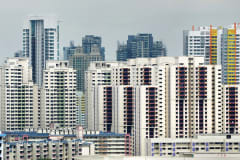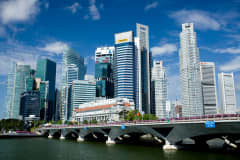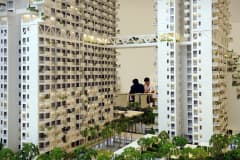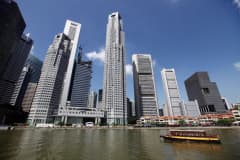With 100 hectares of space available for development, Woodlands Regional Centre is a key component in reshaping northern Singapore laid out in the recent Land Use plan.
Property Launches & Investments
This is some blog description about this site
With 100 hectares of space available for development, Woodlands Regional Centre is a key component in reshaping northern Singapore laid out in the recent Land Use plan.
The Federal Reserve met market expectations Wednesday with another round of easing, this time with a pledge to keep interest rates low until unemployment falls below 6.5 percent and inflation tops 2.5 percent. Economists had been expecting the Federal Reserve to accelerate its debt buying program, known as quantitative easing, to the tune of another $45 billion a month, and the central bank came through.
Private property sales in the primary market fell 26 percent n October from the previous month, according to data form Singapore's Urban Redevelopment Authority, as fresh tightening measures kept home buyers cautious and developers held back on new launches.
And, double-digit declines are expected to continue into 2013. Real estate analysts forecast transaction volumes will fall close to 30 percent next year to 16,000 units, down from 22,000 in 2012.
While Singapore's trade dependent economy has had a tough 2012, even teetering on the brink of a recession earlier this year, the city state's residential property market has remained robust, with prices among the highest in the world.
Private home prices in this Southeast Asian financial hub have risen a whopping 56 percent since the global financial crisis, and most analysts expect this upward trajectory to continue into the new year, even as the market faces a drop in sales volumes amid a somber growth outlook.
Singapore's private housing market has seen months of double-digit declines in sales, including a 44 percent month-on-month fall in November, in part due to a number of cooling measures introduced by the government – yet prices have remained firm.
Singapore's economy grew more vigorously than foreseen in the last three months of 2012, avoiding an expected recession, as gross domestic product (GDP) data for previous quarters was revised downwards.
Singapore's GDP expanded by an annualized 1.8 percent in the fourth quarter from the third quarter after seasonal adjustments, advanced estimates from the Ministry of Trade and Industry showed on Wednesday, reversing a larger than earlier reported 6.3 percent contraction in the July-September period.
Sluggish economic growth and six rounds of property cooling measures over the past three years, yet Singapore home prices remained on the boil in 2012. That can only mean one thing, say analysts: fresh curbs to cool the housing market in the months ahead.
Private home prices in Asia's financial hub, ranked as one of the world's most expensive cities to live in, climbed 2.8 percent last year, according to flash estimates by the city's Urban Redevelopment Authority (URA), after a 1.8 percent rise in the final quarter of 2012 – the fastest pace since the second quarter of 2011.
Singapore on Thursday reported a surprise expansion in its economy in the first quarter, helped by a surge in financial services as trading in stocks and foreign exchange soared.
The Southeast Asian city-state, whose economy is heavily dependent on trade, manufacturing and financial services, said gross domestic product expanded 1.8 percent in January-March on a quarter-on-quarter, seasonally adjusted and annualized rate, much better than the advance estimate of a 1.4 percent contraction.
Singapore's economy grew an annualized 15.2 percent in the second quarter of the year from the first, well above expectations for an 8.3 percent rise in growth and its strongest showing in more than two years, data on Friday showed.
Strong growth in the manufacturing sector was behind the sharp jump in second-quarter gross domestic product (GDP) growth, according to the government's advanced estimates.
The currency has fallen more than 2 percent against the U.S. dollar from a two-month high hit just over two weeks ago, raising the question of whether it may play catch up with neighboring emerging-market currencies that have been caught in a brutal sell-off













